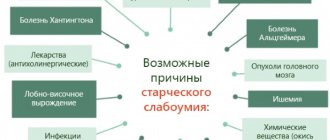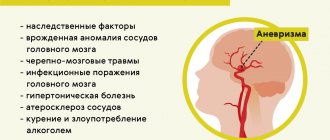As a person ages, various diseases may appear; they often affect the brain and affect its functions. Irritability may increase, aggression may appear, memory may deteriorate, and the ability to think may be impaired. Similar symptoms are typical in cases where Alzheimer's type dementia occurs.
In this case, a gradual disintegration of the personality occurs; the pathology is mainly observed in people over 65 years of age. In rare cases, the pathology can occur in younger people, usually due to injuries and other diseases.
Symptoms of dementia in Alzheimer's disease
At the beginning of the development of the disease, prolonged and treatment-resistant neuroses, depression, paranoid episodes, and psychotic disorders are observed. The patient himself notes a decrease in memory and tries to compensate for it. Orientation in unfamiliar places is impaired, counting and writing become difficult.
The behavior of patients is marked by untidiness, frequent “getting ready for the trip,” and stereotypic behavior. Then the memory impairment is not realized by the patients and spreads to habitual actions - patients forget to shave, dress, and wash. Last but not least, the memory associated with professional skills is impaired.
As the disease progresses, disturbances of other higher cortical functions—praxis, gnosis, and speech—are added. Epileptic seizures and psychotic episodes are possible. In bed, patients make stereotypical movements (covering their heads, “rummaging” movements) or lie motionless. Muscle rigidity and general stiffness increase, and parkinsonism is possible. The addition of somatic pathology can cause delirium.
Varieties
There are different types of dementia of the Alzheimer's type, and when diagnosing, doctors determine the specific type. The disease is divided by time of onset and severity. The treatment regimen and prognosis will depend on this. What types of dementia in Alzheimer's disease exist.
Presenile . It is characterized by early onset before the age of 65, with the pathology progressing rapidly. Symptoms such as speech disorders, impaired practical skills, and loss of the ability to read and write are present.
Senile . It has a late onset, so it is observed after 70 years. Manifestations progress slowly, and the main symptom is a memory problem.
Initial . Alzheimer's type dementia has just appeared and therefore has mild symptoms. A person may be less able to navigate familiar places, perform ordinary tasks more slowly, and also have a worse understanding of money matters. In general, loved ones may not notice negative changes, because they can be explained by old age.
Moderate . The pathology develops and new symptoms arise. A person remembers information much worse, especially those things that just happen. It becomes difficult for the patient to recognize his loved ones, even those with whom he lives. The patient is unable to dress himself or use household items.
Heavy . The person cannot carry on a conversation, does not answer questions and does not talk about his needs. He spends most of his time sleeping or half asleep. He cannot eat food on his own, and his swallowing function is impaired. The patient does not control bowel movements or urination. Such people need to be constantly looked after and cared for.
Alzheimer's dementia is best treated when it is in its early stages. If the patient is in serious condition, then it will be much more difficult to improve his condition. For this reason, it is important to act promptly and not ignore alarming symptoms.
Treatment of dementia due to Alzheimer's disease
- Drug therapy (nootropics, cholinesterase inhibitors, vitamin therapy, antiparkinsonian drugs, vascular drugs, neurometabolites; limited use of tranquilizers and antipsychotics).
- Instructing relatives.
Treatment is prescribed only after confirmation of the diagnosis by a medical specialist.
Essential drugs
There are contraindications. Specialist consultation is required.
- Ipidacrine (anticholinesterase agent). Dosage regimen: orally, at an initial dose of 20 mg/day. (in two doses), then it is increased over 2-4 weeks. before therapeutic (40-80 mg/day in two doses). The duration of treatment is at least 3 months.
- Galantamine (anticholinesterase agent). Dosage regimen: orally, at an initial dose of 8 mg/day. (4 mg morning and evening) for 4 weeks. With good tolerance from the 5th week. the daily dose is increased to 16 mg (8 mg in the morning and evening). With insufficient effectiveness and good tolerability from the 9th week. treatment, the daily dose can be increased to 24 mg (12 mg in the morning and evening). Duration of treatment is at least 3-6 months.
- Memantine (neuroprotective agent). Dosage regimen: orally, at an initial dose of 5 mg (once in the morning), every 5 days the daily dosage is increased by 5 mg (in two doses) until the therapeutic dose is reached. The course of treatment is at least 3 months.
- Piracetam (nootropic drug). Dosage regimen: orally, with liquid at a dose of 400-800 mg in 3 divided doses.
- Cerebrolysin (nootropic drug). Dosage regimen: intravenously, at a dose of 20-30 ml of the drug in 100 ml of 0.9% sodium chloride solution, 20 infusions per course. A course of treatment with Cerebrolysin 1-2 times a year is recommended.
Characteristic
Dementia in Alzheimer's disease is a dementia that is most often observed in old age and is caused by damage to the brain.
With this pathology, there is a loss of intelligence, the ability to remember, as well as cognitive functions. As a result, a person gradually degrades and becomes unable to even take care of himself. The pathology progresses slowly, but ultimately leads to a complete loss of basic abilities.
Dementia in Alzheimer's disease is characterized by the deposition of proteins in neuronal cells, as well as in the strands of neurofibrillary tangles. Because of this, the connections between cells are destroyed, which leads to disorders in the brain.
This pathological process leads to a gradual loss of mental function and, as a result, to complete personal degradation. Over time, more and more parts of the brain die, causing a person’s well-being to deteriorate.
The likelihood of encountering the disease after the age of 85 is significantly higher. In elderly people it is observed in approximately 50% of cases. Moreover, after 75 years, the probability increases to 15%. One feature of the pathology should be taken into account.
Presenile dementia, which began at age 65, develops rapidly. With it, you can notice obvious cognitive impairment. If senile pathology appeared after 70 years, then it will slowly progress, and memory deterioration is mainly noted .
If dementia occurs due to Alzheimer's disease, timely measures must be taken. You will definitely need to see a doctor to start treatment in a timely manner. In this case, it will be possible to prolong a person’s life as much as possible.
Doctors give different prognosis, some patients live for 5 years, while others can last another 15 years or longer. Much will depend on the quality of care and the efforts of the patient.
Incidence (per 100,000 people)
| Men | Women | |||||||||||||
| Age, years | 0-1 | 1-3 | 3-14 | 14-25 | 25-40 | 40-60 | 60 + | 0-1 | 1-3 | 3-14 | 14-25 | 25-40 | 40-60 | 60 + |
| Number of sick people | 0 | 0 | 0 | 0 | 0 | 2 | 800 | 0 | 0 | 0 | 0 | 0 | 1 | 500 |
Causes
Factors that increase the risk of developing Alzheimer's dementia:
- elderly and senile age;
- heredity;
- vascular factor: hypertension, atherosclerosis;
- diabetes mellitus (doubles the existing risk by half;
- low or overweight;
- traumatic brain injuries;
- mental disorders and addiction syndrome: depression, alcoholism, smoking;
- nutritional disorder: overeating fish;
- hormonal factors: excess estrogen levels, thyroid disease.
See also: Nursing.
Symptoms
| Occurrence (how often a symptom occurs in a given disease) | |
| Memory loss (memory impairment, poor memory, memory impairment, forgetfulness) | 100% |
| Decreased thinking | 90% |
| Circadian rhythm inversion (sleep-wake rhythm disorder) | 80% |
| Depressed mood (bad mood) | 80% |
| Increased irritability (nervousness, psychosis) | 70% |
| Disinhibition | 70% |
| Visual hallucinations | 20% |
Diagnostic methods
Dementia of the Alzheimer's type requires special diagnostics to help identify the disease. Just knowing the symptoms will not be enough; you will need to undergo a series of examinations.
At the first symptoms, you should consult a neurologist or psychiatrist . They will be able to guess what kind of disease the person had to face. Next, studies will be ordered that will confirm or refute the diagnosis.
Patients are prescribed an MRI because this procedure provides detailed information about the state of the brain. It will be possible to determine whether there are any abnormalities that may give similar symptoms.
If there are no diseases, then we can assume the presence of dementia of the Alzheimer's type. In addition, a computed tomography scan is performed, which also provides information about the state of the brain.
For patients, a biochemical blood test is performed, because with its help it will be possible to identify some abnormalities. Experts determine whether there is vitamin B12 in the blood, as well as folic acid. An electrocardiogram and EEG are performed to identify other pathologies.
The specialist may refer you for a puncture of the cerebrospinal fluid, as well as a study of the reaction of the pupils. If necessary, the condition of other organs is studied if there is a suspicion of their pathology.
Special tests may be required to determine the presence of the disease. For example, a drawing procedure is used to search for hidden meaning. Neuropsychological testing is also performed to detect Alzheimer's dementia.
Based on the results of the completed procedures, it will be possible to understand exactly what problem you are dealing with. It may be that the characteristic symptoms are caused by the vascular system. Sometimes the diagnosis remains unspecified, but this happens quite rarely. As soon as it is possible to understand what exactly is happening to the person, it will be necessary to begin treatment.










